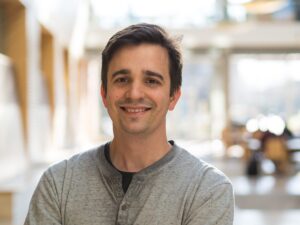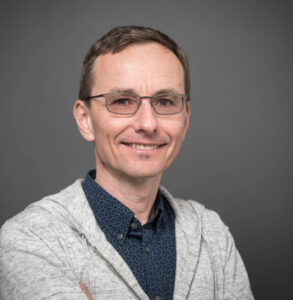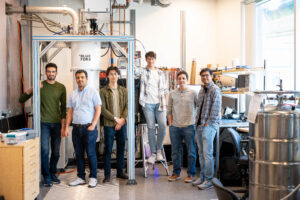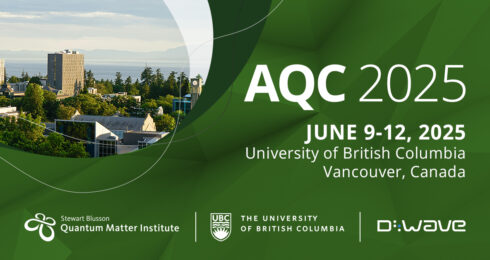Researchers from UBC’s Stewart Blusson Quantum Matter Institute (Blusson QMI) have been awarded more than $5.8 million under the recent round of the Natural Sciences and Engineering Research Council of Canada (NSERC) Alliance grants announced by the Government of Canada today.
Blusson QMI Scientific Director Prof. Andrea Damascelli congratulated the grant recipients and said the investment is a testament to the key role that quantum materials research will play in the success of the recently launched National Quantum Strategy (NQS), and in cementing Canada’s position as a global leader in the quantum arena.
“In the early days, we engaged with the government to lay the foundation for the NQS. Today, we’re proud to be a key research partner supporting the implementation of the Strategy through delivering high-impact R&D programs that bring together our researchers with local and international partners,” Damascelli said.
“BC has a strong ecosystem of world-leading researchers and quantum technology companies. By working together and sustained investment, the province could become a key driver of quantum science in the world.”
Blusson QMI Principal Investigator and Assistant Professor at UBC’s Department of Electrical and Computer Engineering Joseph Salfi was awarded $4.9 million to lead a pan-Canadian consortium with the Universite de Sherbrooke, the University of Waterloo, Ecole Polytechnique de Montreal, and McGill University. The consortium aims to advance the science and technology of quantum computation in Canada via the design, fabrication, and investigation of a new quantum processor, the key technological component of a quantum computer.

Image: Dr. Joe Salfi, Blusson QMI Principal Investigator and Assistant Professor at UBC’s Department of Electrical and Computer Engineering.
“If we can unlock its power, quantum computing could revolutionize how we tackle problems like energy conversion, storage, and climate change,” said Salfi.
“Imagine if we could model molecules to help us discover new drugs, design new materials, or simulate how to capture and transform greenhouse gases into something useful. Classical computing can’t perform those types of complex calculations – but quantum computing holds the potential to do this.
“Our goal is to investigate and demonstrate a new quantum computer architecture that is designed from the ground up for reliable and flexible simulation of materials and chemistry, long before general-purpose quantum computation can solve difficult computational problems.”
Key partnerships enable the consortium to move quickly along its science and technology roadmap: the National Research Council of Canada, CMC Microsystems, the Canadian company 1QBit Information Technologies, the Leibniz-Institut für Kristallzüchtung in Germany, multinationals Keysight Technologies, and Oxford Instruments, and strategic partners called the Sherbrooke Innovation Zone in Quebec and the Quantum Algorithms Institute of British Columbia.
Another funded research program ($911,400) led by Blusson QMI Deputy Scientific Director and Professor at UBC’s Department of Physics & Astronomy, Marcel Franz, brings together researchers with industry leader D-Wave Systems Inc to answer key questions about the power of a specific model of quantum computation called quantum annealing.

Image: Dr. Marcel Franz, Blusson QMI’s Deputy Scientific Director and Professor at UBC’s Department of Physics & Astronomy.
“Our objective is to show that the quantum annealer can efficiently solve optimization problems that cannot be solved by the currently available classical computers,” said Franz.
“The hope is to firmly establish the “quantum advantage” of the D-Wave hardware by benchmarking its performance against the most powerful known classical algorithms.”
D-Wave Systems was founded in 1999 as a UBC offshoot. Two of the four founders—Geordie Rose (former CEO/CTO) and Alexandre Zagoskin (former VP Research and Chief Scientist)—studied at UBC’s Department of Physics & Astronomy. Rose was a PhD student and Zagoskin was a postdoctoral fellow. They named the company after their first cubit designs, which used d-wave superconductors.
“It is very fitting that the NSERC Alliance Quantum program is now enabling significantly expanded collaborations between UBC and D-Wave researchers aimed at what increasingly looks like a successful practical implementation of deep ideas originally conceived here at the UBC Vancouver campus,” Franz said.
Also funded was a project by Damascelli and a second project by Salfi under the Alliance International Quantum grants category aimed at supporting researchers to establish and grow international collaborations in quantum science and technology.
Under the recent round of the NSERC Alliance grants and Collaborative Research and Training Experience (CREATE) grants announced today, the federal government has committed a total investment of nearly $51 million awarded to 75 recipients to turbocharge Canada’s quantum capabilities. The grants will also enable the advanced training of more than 900 graduates and postdoctoral fellows in the field.
Media contact: Shahrzad (Zad) Abbasi | 604 360 6761 | shahrzad.abbasi@ubc.ca

Image (left to right): Mohammad Khalifa (PhD candidate), Dr. Ebrahim Sajadi (Postdoctoral Fellow), Philip Kirwin (MSc candidate, primary supervisor Lukas Chrostowski), Nusair Islam (Undergraduate researcher), Dr. Joe Salfi, Mukhlasur Tanvir (PhD candidate), Quantum Science and Technology Laboratory, UBC (as captured by Paul Joseph, UBC).


